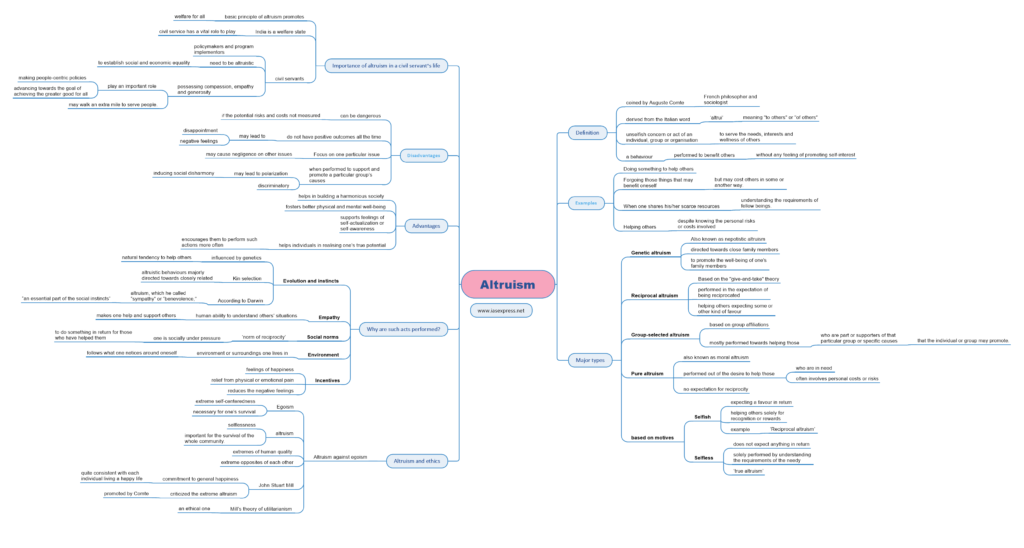Altruism (Meaning, Types and Ethics)

From Current Affairs Notes for UPSC » Editorials & In-depths » This topic
IAS EXPRESS Vs UPSC Prelims 2024: 85+ questions reflected
In a recent move, The Ministry of Road Transports and Highways has decided to reward Good Samaritans (those who save lives of road accident victims) with a cash prize to recognize their altruistic act. In the fast-moving present world, there is a dearth of ethical acts and behaviour. People tend to think more of their interests rather than about helping others when the latter are in dire need. Given this scenario, the move comes as a hope that will encourage people to perform such altruistic acts more often in one or another way.

Altruism – definition
The term ‘altruism’ was coined by French philosopher and sociologist Auguste Comte. It is derived from the Italian word ‘altrui’, meaning “to others” or “of others”.
It refers to that unselfish concern or act of an individual, group or organisation which is done to serve the needs, interests and wellness of others. In other words, it is a behaviour that is performed to benefit others without any feeling of promoting self-interest.
Some examples of altruism are:
- Doing something to help others (human or animal) without expecting anything in return.
- Forgoing those things that may benefit oneself but may cost others in some or another way.
- When one shares his/her scarce resources understanding the requirements of fellow beings.
- Helping others despite knowing the personal risks or costs involved.
- Expressing concern for the well-being of others.
Major types
- Genetic altruism
- Also known as nepotistic altruism.
- This altruistic act or behaviour is directed towards close family members. It is done to promote the well-being of one’s family members.
- One example can be of parents sacrificing their time, sleep, hobbies and other needs to serve their children’s interests.
- Reciprocal altruism
- Based on the “give-and-take” theory.
- This kind of altruistic act is performed in the expectation of being reciprocated at some point of time in future. In other words, this type of altruism involves one helping others expecting some or other kind of favour from the person being helped.
- Example: Helping one’s colleague in some office work expecting that he/she may also help the former when it is required.
- It may lead to disappointment if not reciprocated.
- Group-selected altruism
- When one performs altruistic acts based on group affiliations.
- These altruistic acts are mostly performed towards helping those who are part or supporters of that particular group or specific causes that the individual or group may promote.
- Examples include advocates appearing in court cases free of cost on behalf of those who may promote the former’s causes.
- Pure altruism
- It is also known as moral altruism.
- One performs such altruistic acts out of the desire to help those who are in need even if it involves personal costs or risks.
- Those who perform these acts do not expect anything in return or one can say there is no expectation for reciprocity.
Altruism can be also classified based on motives. These are:
- Selfish
- When one performs altruistic acts expecting a favour in return.
- This involves helping others solely for recognition or rewards.
- ‘Reciprocal altruism’ can be considered one of the examples.
- Selfless
- Such an altruistic act does not expect anything in return or reciprocity.
- It is solely performed by understanding the requirements of those who are in need.
- This can be termed as ‘true altruism’.
Why are such acts performed?
Generosity and morality are the primary causes behind altruism yet there are other causes as well. These are:
- Evolution and instincts – Different theories regarding evolution and altruistic behaviour are there.
- Some suggest that altruism may be influenced by genetics (natural tendency to help others) while others argue that instincts play a vital role.
- Kin selection is one such theory where it is believed that altruistic behaviours are majorly directed towards those to whom one is closely related.
- According to Darwin, altruism, which he called “sympathy” or “benevolence,” is “an essential part of the social instincts”.
- Empathy – Empathy is the human ability to understand others’ situations and figure out how it feels to be in that place. When one feels empathetic towards fellow beings who need help and support, he/she often helps them.
- Social norms – Those actions which are generally practised in society and considered to be social rules or norms also influence altruistic behaviour.
- One such norm is the ‘norm of reciprocity where one is socially under pressure to do something in return for those who have helped them.
- It can be also termed as ‘modelled altruism’.
- Environment – The environment or surroundings one lives in has a major impact on his/her behaviour. One tends to follow what one notices around oneself. Children who have altruistic parents may imitate or imbibe this behaviour in some or another way.
- Incentives – One of the most important reasons why one engages in altruistic behaviour is incentives.
- These incentives can be in form of feelings of happiness or relief from physical or emotional pain after helping others.
- Helping others also drives away or reduces the negative feelings one undergoes when one notices someone in distress.
Advantages
- Altruism helps in building a harmonious society as it involves compassion, empathy and care for fellow beings.
- It also fosters better physical and mental well-being. When one helps and supports others in need, it reduces negative feelings and promotes overall health and happiness.
- It supports feelings of self-actualization or self-awareness. It also helps individuals in realising one’s true potential and encourages them to perform such actions more often thus helping in the welfare of others.
Disadvantages
- Performing altruistic acts without properly measuring the potential risks and costs involved can be dangerous.
- Altruistic acts do not have positive outcomes all the time. This may lead to disappointment and negative feelings towards performing altruistic acts further.
- Focus on one particular issue may cause negligence on other issues which also need equal altruistic actions.
- When altruistic acts are performed to support and promote a particular group’s causes, this may be discriminatory and may lead to polarization thus inducing social disharmony.
- Others.
Altruism and ethics
- Altruism against egoism
- Egoism refers to extreme self-centeredness whereas altruism refers to selflessness.
- These are considered to be extremes of human quality and extreme opposites of each other. On one hand, egoism is necessary for one’s survival but on the other hand, selfless actions are important for the survival of the whole community.
- There have been debates for a long time regarding the establishment of a harmonious balance between self-interest and altruism.
- As per utilitarianism as discussed by John Stuart Mill, a good act is that one which would increase the general prevalence of pleasure over pain in the whole of society.
- However, Mill made clear that this does not imply a one-sided commitment to altruism. Mill’s theory says that a commitment to general happiness was quite consistent with each individual living a happy life. He criticized the extreme altruism promoted by Comte which preferred the idea of happiness for all, procured by the painful self-sacrifice of each.
- Thus, Mill’s theory of utilitarianism can be termed as an ethical one.
Importance of altruism in a civil servant’s life
- The basic principle of altruism promotes welfare for all. The Directive Principles of State Policy in the Indian Constitution indicate that India is a welfare state. Hence, in a welfare state like India, civil service has a vital role to play.
- Being the policymakers and program implementors at the ground level, civil servants need to be altruistic to establish social and economic equality.
- Civil servants possessing compassion, empathy and generosity which form the very base of altruism may play an important role in making people-centric policies and advancing towards the goal of achieving the greater good for all.
- Altruism being one of their prominent traits may help them walk an extra mile to serve people.
Way forward
Altruism has several psychological, social and philosophical aspects. It is considerably difficult to strike a balance between all the aspects yet each of us must possess such an essential quality and practise it to promote personal and social well-being.
If you like this post, please share your feedback in the comments section below so that we will upload more posts like this.

